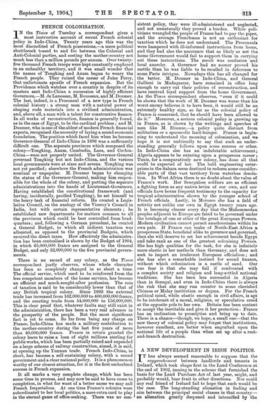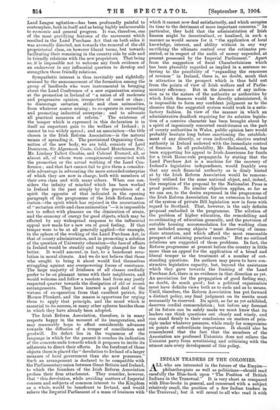I T has always seemed reasonable to suppose that the rapprochement
between landlords and tenants in Ireland, which took shape first in the Land Conference at the end of 1902, issuing in the scheme that furnished the basis for the Land Purchase Act of last year, might, and probably would, bear fruit in other directions. Nor could any real friend of Ireland fail to hope that such would be the case. The long-standing alienation in feeling and aim between the principal social classes in that country— an alienation greatly deepened and intensified by the Land League agitation—has been profoundly painful to contemplate, both in itself and as being highly unfavourable to economic and general progress. It was, therefore, one of the most gratifying features of the movement which resulted in the Land Purchase Act that on both sides it was avowedly directed, not towards the removal of the old proprietorial class, on however liberal terms, but towards facilitating their remaining in the country side by side and in friendly relations with the new proprietors. That being BO, it is impossible not to welcome any fresh evidence of an endeavour in any influential quarters to develop and strengthen those friendly relations.
Sympathetic interest is thus inevitably and rightfully aroused by the announcement of the formation among the group of landlords who were instrumental in bringing about the Land Conference of a new organisation aiming at the promotion in Ireland of "a union of all moderate and progressive opinion, irrespective of creed or class ; to discourage sectarian strife and class animosities, from whatever source arising ; to co-operate in recreating and promoting industrial enterprise ; and to advocate all practical measures of reform." The existence of the temper which is expressed in this declaration is in itself an important gain to the welfare of Ireland ; it cannot be too widely spread ; and an association—the title chosen is the Irish Reform Association—is the natural means of spreading it. The provisional Organising Com- mittee of the new body, we are told, consists of Lord Dunraven, Sir Algernoon Coote, Colonel Hutchinson Poe, Mr. Lindsay Talbot Crosbie, and Colonel Everard, all, or almost all, of whom were conspicuously connected with the promotion or the actual working of the Land Con- ference; and that fact cannot fail to give them a. consider- able advantage in advocating the more extended enterprise of which they are now in charge, both with members of their own class and with many others. When one con- siders the infinity of mischief which has been worked in Ireland in the past simply by the prevalence of a spirit the opposite of that indicated in the opening paragraph of the programme of the Irish Reform Asso- ciation—the spirit which has rejoiced in the accentuation of " sectarian strife and class animosities "—it is impossible not to reflect with pleasure on the diminution of strain, and the economy of energy for good objects, which may be effected by any widespread response to the influential appeal now made for a new era of good feeling. If that temper were to be at all generally applied—for example, in the sphere of the working of the Land Purchase Act, in that of county administration, and in promoting a solution of the question of University education—the face of affairs in Ireland would be steadily and rapidly changed for the better. It would amount, in fact, to a beneficent revo- lution in moral climate. And we do not believe that those who sought to bring it about would find themselves struggling against any overpowering forces of resistance. The large majority of Irishmen of all classes cordially prefer to be on pleasant terms with their neighbours, and would welcome and follow a resolute lead from any justly respected quarter towards the dissipation of old or recent estrangements. They have learned a good deal of the virtues of co-operation from that excellent patriot, Sir Horace Plunkett, and the season is opportune for urging them to apply that principle, and the mood which is essential to its success, in many other spheres besides those in which they have already been adopted.
The Irish Reform Association, therefore, is in many respects happy in the moment of its inauguration, and may reasonably hope to effect considerable advances towards the diffusion of a temper of conciliation and goodwill. Its defect lies in the vagueness of the language in which for the present it couches its indication of the concrete ends towards which it proposes to invite its adherents to direct their efforts. In the forefront of those objects there is placed the" devolution to Ireland of a larger measure of local government than she now possesses." Such an arrangement is declared to be compatible with the Parliamentary union between Great Britain and Ireland, to which the founders of the Irish Reform Association profess their firm attachment. They consider, however, that "this devolution, while avoiding matters of Imperial concern and subjects of common interest to the Kingdom as a whole, would be beneficent to Ireland, and_ would relieve the Imperial Parliament of a mass of business with which it cannot now deal satisfactorily, and which occupies its time to the detriment of more important concerns." In particular, they hold that the administration of Irish finance might be decentralised, or localised, in such a manner as would. secure for it "the application of local knowledge, interest, and ability without in any way sacrificing the ultimate control over the estimates pre- sented, or in respect of the audit of money expended, at present possessed by the Imperial Parliament." Apart from the suggestion of fiscal Chamberlainism which has been plausibly regarded as implied in a sentence re- ferring to the possibility of "expanding the resources of revenue" in Ireland, there is, no doubt, much that is attractive in the prospect which is thus held out from the points of view of Irish welfare and of Parlia- mentary efficiency. But in the absence of any indica- tion as to the nature of the authority or authorities by which Irish finances would be directly administered, it is impossible to form any confident judgment as to the chances that the suggested system would work in a satis- factory fashion. In view of the manner in which an administrative deadlock requiring for its solution legisla- tion of a coercive character has been brought about by a spirit of ingeniously concerted recalcitrance on the part of county authorities in Wales, public opinion here would probably hesitate long before sanctioning the establish- ment of any directly, or even indirectly, elective central authority in Ireland endowed with the immediate control of finances. In all probability, Mr. Redmond, who has been supporting his appeal to Irish-Americans for funds for a fresh Home-rule propaganda by stating that the Land Purchase Act is a machine for the recovery of Ireland's legislative independence, would frankly own that any such financial authority as is dimly hinted at by the Irish Reform Association would be remorse- lessly utilised for the same national object, and, indeed, the reception of the proposal by the Nationalist Press is proof positive. No similar objection applies, so far as we can see, to the desire expressed in the programme of the Irish Reform Association for an extension to Ireland of the system of private Bill legislation now in force with regard to Scotland. That, however, is the only definite proposal embodied in the programme. The solution of the problem of higher education, the remodelling and co-ordinating of education generally, and the provision of suitable housing accommodation for the working class are included among objects "most deserving of imme- diate attention, and which afford the most reasonable prospect of attaining practical results." But no outlined solutions are suggested of these problems. In fact, the Reform programme at present before the country is little more than an appeal for the application of a broad and liberal temper to the treatment of a number of out- standing questions. Its authors may prove to have con- structive legislative capacity, but, beyond the assistance which they gave towards the framing of the Land Purchase Act, there is no evidence in that direction as yet. An association for the propagation of good feeling may, no doubt, do much good ; but a political organisation must have definite views both as to ends and as to means. Until, therefore, the Reform Association has put forward a distinct policy, any final judgment on its merits must necessarily be reserved. Its spirit, so far as yet exhibited, deserves cordial commendation ; but before any forecast of its future can be safely made we must know that its leaders can think questions out clearly and wisely, and can stand firmly to their conclusions on matters of prin- ciple under whatever pressure, while ready for compromise on points of subordinate importance. It should also be remembered that the fact that the members of the Association are professed Unionists does not relieve the Unionist party from scrutinising and criticising with the utmost care every development of this policy.







































 Previous page
Previous page